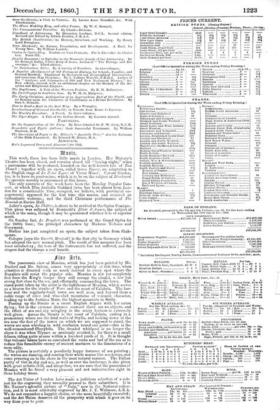lint arts.
The panoramic view of Messina, which has just been painted by Mr. Burford and Mr. Salons, comes very appropriately at this time, when attention is directed with so much interest to every spot where the Royalists still resist the popular side. Messina is not yet completely free from the King's troops : they still occupy the citadel, a low but strong fort close to the sea, and effectually commanding the town. The stand-point taken by the artist is the lighthouse of Messina, which serves as a beacon for the straits of Faro and the coast of Calabria. The har- bour and the regularly-built town are well seen, and beyond them a noble range of olive and vine-clad mountains of volcanic character, leading up to the Antinna Mare, the highest mountain in Sicily.
Passing up the Straits is a smart English frigate with her union Hying ; but in the extreme distance seaward there are no objects, and the effect of sea and sky mingling in the misty horizon is extremely well given. Across the Straits is the coast of Calabria, ending in a promontory where are the fatal rocks of Scylla, and looking down at the sea near the foot of the tower on which we are supposed to stand, the waves are seen whirling in wild confusion round one point—this is the well-remembered Charybdis. The dreaded whirlpool is no longer the abyss it was when'Ulysses so anxiously avoided it, for there is a small felucca riding quite at ease within a hundred yards of it. It is thought that volcanic forces have so convulsed the rocks and bed of the sea as to reduce this formidable enemy of ancient mariners to the dimensions of a mere eddy. The picture is certainly a peculiarly happy instance of sea painting ; the waves are dancing, and rearing their white manes like sea-horses, and come prancing on to the shore in the most natural manner. The Italian purity of tint in sky and sea, as well as over the landscape, is also given with great artistic skill, and altogether, we are sure that the panorama of Messina will be found a very pleasant and not uninstructive sight in these holiday times.
The Art Union of London have made a judicious selection of a sub- ject for the engraving they annually present to their subscribers. It is Mr. Turner's splendid picture of " Italy," now in the National collec- tion, and it is most admirably engraved by Mr. J. T. Willmore, A.R.A. We do not remember a happier choice, or one more beautifully executed; and the Art Union deserves all the prosperity with which it goes on its way from year to yeat.


























 Previous page
Previous page